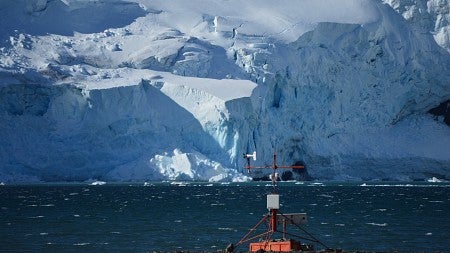
The University of Oregon community is justifiably proud of our research and teaching around climate change—its impacts, how we understand and plan for it, and possible mitigation and reversal strategies. While not strictly part of our Climate Action Plan (CAP), our institution's research represents a vital and significant contribution to human understanding of climate change and our teaching prepares students to respond intellectually and professionally to its many challenges. In response to input from UO students, President Michael Schill committed to increasing support for climate change education and research.
Research into human-caused climate change and what people should do about it touches almost every area of the university, including our professional schools such as the Schools of Law, Education, Business, Design, and Journalism and Communications. Researchers in the social, natural, and physical sciences study everything from how climate change increases wildfires, affects indigenous and rural communities, and changes the ecology of grasslands to how to make chemistry more sustainable throughout a product's life-cycle. Researchers in the arts and humanities represent climate change in human or aesthetic terms and help people make sense of its consequences and what we must do to respond.
Most of our researchers are also educators, and UO students benefit from the combination of cutting edge climate change research coupled with innovative teaching from established experts. These classroom experiences set students up for careers in a rapidly-changing world and prepare them to be mentally-rigorous and intellectually-curious citizens in the complicated future that lies ahead.
Here is a brief snapshot of just some of the faculty contributing to research and teaching related to climate change
Mary Christina Wood – Professor in the School of Law
Professor Wood founded and directs the top-ranked Environmental and Natural Resources Law Center. She is the creator of the “Atmospheric Trust Litigation,” which builds on the centuries-old Public Trust doctrine to argue that citizens have a right to a livable planet, that the climate itself is a public trust. This work is at the heart of the Juliana vs. US lawsuit currently under review in federal court.
Stephanie LeMenager – Professor of English and Environmental Studies
Professor LeMenager co-leads the Center for Environmental Futures, which is an interdisciplinary collective of faculty and students focused on the intersection of environmentalism and social justice. Her research focuses on the place of the human in the era of climate change, both looking at the historical and cultural contexts leading to the present crisis and also considering what the future may bring and mean for humanity.
Erin E. Moore – Associate Professor in the College of Design’s School of Architecture and in the Environmental Studies Program and Head of the School of Architecture and the Environment
Professor Moore researches the life cycle impacts of building construction and how buildings reflect and construct human understandings of nature. She also studies how buildings can be designed specifically for an intended ecological context. Her most recent work focuses explicitly on climate change and how buildings consume fossil fuels and can also contribute to carbon sequestration.
Science and Memory Project – School of Journalism and Communications
Founding faculty: Mark Blaine, Torsten Kjellstrand, Deborah Morrison, and Dan Morrison
The Science and Memory Project trains students in how to convey the complex story of climate change in compelling multi-media digital narratives. Students have visited Alaska, Ghana, and the Oregon Coast, learning about the impacts of climate change in the area and the science behind it, before creating projects that convey that complicated story to a general audience.
Marc Schlossberg – Professor in the School of Planning, Public Policy and Management
Professor Schlossberg researches how to make cities more conducive to walking, biking, and other means of sustainable transportation. He also helms the Sustainable Cities Institute, an applied think-tank that supports regional, metropolitan clients in envisioning increased sustainability in their city through student work projects.
Shannon Boettcher – Associate Professor in Chemistry and Biochemistry
Professor Boettcher’s research focuses on “developing inorganic materials for solar energy conversion and storage.” The goal is to make solar energy efficient and scalable as part of a necessary transition away from fossil fuels. He is part of UO's Materials Science Institute.
